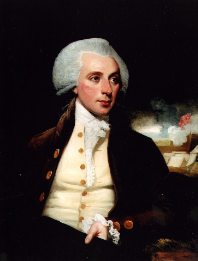William Stephens Smith: A Prominent Figure in Early American History
William Stephens Smith (November 8, 1755 – June 10, 1816) was a notable American political and military figure during the formative years of the United States. His life intersected with some of the most prominent families and events of his time, making him an intriguing subject for historical study.
Casey Adams
7/16/20243 min read


Early Life and Education:
Born in Long Island, New York, Smith came from a family of means and influence. He received his early education in local schools before attending the College of New Jersey (now Princeton University).
This educational background prepared him for the roles he would later take on in military and public service.
Military Career during the American Revolution:
Smith's most significant contributions came during the American Revolutionary War. He joined the Continental Army in 1776 and quickly rose through the ranks due to his leadership abilities and dedication to the revolutionary cause. Some of his notable military experiences include:
Serving as an aide-de-camp to General John Sullivan
Participating in the Battle of Long Island and other key engagements
Achieving the rank of Lieutenant Colonel by the war's end
His military service brought him into contact with many influential figures of the Revolution, including General George Washington.
Diplomatic Career:
After the war, Smith's experiences and connections led him into the realm of diplomacy. He served as Secretary of the American Legation in London from 1784 to 1788 and in the background, this is when the American Constitution was ratified.
This position was crucial in establishing early diplomatic relations between the newly independent United States and Great Britain.
Marriage to Abigail Adams Smith:
Perhaps the most consequential personal event in Smith's life was his marriage to Abigail "Nabby" Adams in 1786.
Nabby was the only daughter of John Adams, who would become the second President of the United States. This union connected Smith to one of the most influential families in American politics. Key points about this marriage include:
The wedding took place in London while John Adams was serving as U.S. Minister to Great Britain
The marriage produced four children
It established Smith as a brother-in-law to future president John Quincy Adams
Smith became an uncle to Charles Francis Adams Sr., who would later serve as U.S. Ambassador to the United Kingdom
Political Career:
Smith's connections and experiences positioned him well for a career in politics. He served as a United States Representative from New York from 1813 to 1815. During his time in Congress, he:
Represented New York's 17th congressional district
Served on various committees
Contributed to debates on national issues of the time
However, his political career was not without controversy. Smith was implicated in the Miranda affair, a failed attempt to liberate Spanish colonies in South America led by Francisco de Miranda.
This incident damaged his reputation and likely impacted his political aspirations.
Later Life and Legacy:
After his term in Congress, Smith returned to private life. He passed away on June 10, 1816, in Lebanon, New York.
While not as widely remembered as his famous in-laws, Smith's life provides a fascinating window into the interconnected world of early American politics and society.
His legacy lives on through:
His descendants, some of whom continued to play significant roles in American history
His correspondence and papers, which offer valuable insights into the political and social dynamics of the early republic
His connections to the Adams family, which help illustrate the complex familial networks that often underpinned political power in early America
Conclusion:
William Stephens Smith's life encapsulates many aspects of the early American experience. From military service in the Revolution to diplomatic posts abroad, from marriage into a political dynasty to serving in Congress, Smith's career trajectory reflects the opportunities and challenges faced by many in the founding generation.
While he may not be as well-known as some of his contemporaries, his story provides a valuable perspective on the personal and political dynamics that shaped the early United States.
Look into the Miranda affair, In essence, Miranda was attempting to be for South America what George Washington and other Founding Fathers were for North America - a liberator and founder of a new nation (or group of nations).
His 1806 expedition was meant to be the spark that would ignite a continent-wide revolution against Spanish colonial rule, paving the way for his grand vision of a unified, independent Latin America.
William Stephens Smith



